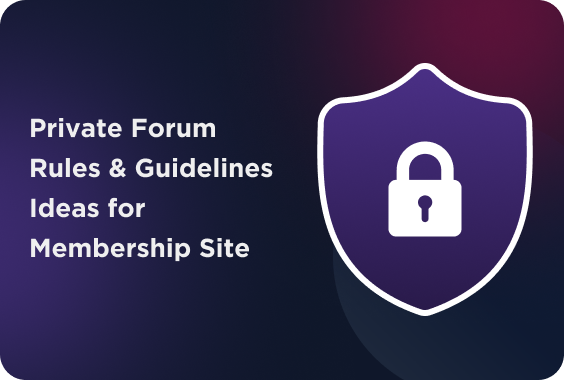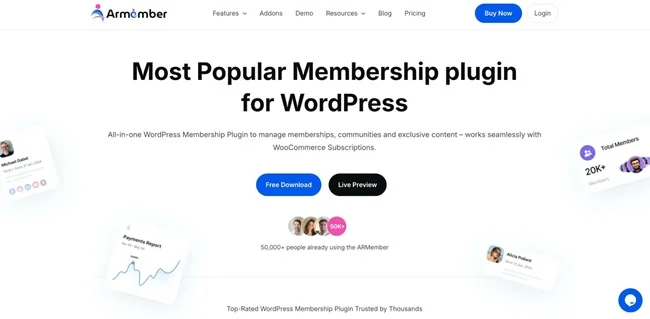If you want to build a controlled forum for conversations inside your community – or have already done so – it won’t be a proper one without rules and guidelines.
In this article, we’re taking a look at the possible rule types and nuances you can easily apply to your scenario. Let’s get started.
What Is a Private Forum?

Think of Reddit – but as not available to everyone. A private forum is an online space for discussion but accessible to approved users (your members or clients).
Another good example is Facebook private groups, where you need to pass some sort of a test to be accepted.
In terms of its nature, a private forum is a regular forum just like Reddit we’ve mentioned, but with access locked behind logins, permissions, or paid memberships.
A space is usually considered a “forum” (not just a comment box or chat) if it has:
- Discussion boards (forums) on specific topics.
- Threads (topics) where conversations happen.
- Replies that build a discussion over time.
- User accounts with profiles and permissions (members, moderators, admins).
- Moderation tools like reporting, banning, editing, and closing threads.
When Are Private Forums Used on Membership Sites?
Private forums show up on a lot of membership sites!
Sometimes people need ongoing discussion or even support from a site owner or influencers associated with the site, or accountability, such as:
- Coaching and consulting (business, fitness, mindset, career)
- Online courses and academies (especially for peer-to-peer help)
- Hobby and interest clubs
- Professional associations and trade groups.
What’s the goal of a private forum?
First of all, forums are often added by membership site owners to help increase member retention – people who talk, stay.
Some memberships require support from group answers and searchable topics. Another scenario – membership site owners use forums to build better authority and trust or simply collect feedback and ideas from real members.
Most membership sites don’t run forums as standalone features – they’re usually integrated like this:
- Only paying or approved members can see and post.
- A dedicated forum per course, program, or cohort, which is a ‘linked’ solution.
- Tied to user roles, e.g. coaches/moderators have extra tools.
- Used as a support area for FAQs or troubleshooting.
Everyone benefits from private forums – members get networking opportunities, feedback and encouragement, while owners can expect better stickiness and more user-generated ideas. So, members think about community and support, and you think about retention and efficiency.
Good private forum rules and guidelines serve both sides!
Major Private Forum Rules & Guideline Ideas
A private forum is only sustainable when regulated with the rules that are balanced and appropriate.
We’ve gathered some common rules that work on almost any private forum, followed by specific examples for different membership types, and of course, a few tips on implementing and enforcing them.
Common Private Forum Rules That Work Everywhere
These rules apply to nearly any membership site, regardless of niche.
You can simply copy and paste them if you are building a list of rules that you want to apply to your private forum.
- Be respectful
- No personal attacks, harassment, or hate speech.
- Critique ideas, not people.
- Assume good intent and stay solution-focused.
Example of private forum rule text:
“We treat each other with respect! Thus, disagreements are fine; disrespect is not so, no insults, name-calling, harassment, or discriminatory language”.
- Stay on topic
- Always tell members to keep posts relevant to the forum category or thread
- Create a new topic instead of getting on with an existing one
Example rule text:
“Keep your posts related to the topic of the forum or thread. If you want to discuss something new, please start a new topic”.
- No spam or self-promotion (unless you want or allowed)
- No unsolicited promos, affiliate links, or constant pitching
- If promotion is allowed, define where and how often because it’s needed
Example rule text:
“No spam, mass messaging, or unsolicited promotions. Sharing your own products or links is not allowed”.
- Respect privacy
- What’s shared in the community stays in the community.
- No sharing screenshots or content externally without permission because it’s a private forum.
Example private forum rule text:
“Do Not Share screenshots, posts or any kind of personal data outside of this private forum or community without explicit consent from everyone..”.
- Follow content boundaries
- No illegal content, piracy, or explicit material (unless your niche requires it and you’re compliant with laws).
- Define what is strictly not allowed.
Example rule text:
“Do not post illegal content, pirated materials, or adult/explicit content.”
- Use descriptive titles
- Helps search and reduces duplicate questions.
Example rule text:
“Use descriptive titles that summarize your question or topic instead of ‘Help!’ or ‘Question’”.
- Respect moderators and decisions
- Moderators keep the space safe and their decisions are final.
Example rule text:
“Moderators may edit, move, or remove posts that break or weaken the community rules. If you disagree with a decision, contact us privately instead of arguing publicly”.
Also note – these private forum rules would work better if you add your ‘brand voice’ to them, so they can contain more humor, or, vice versa, sound more strict.
Some Private Forum Have Extra Rules by Membership Type
Different kinds of membership sites have very different needs – and rules may reflect that too, changing based on what your community is about.
Let’s take a look at a few private forum rule examples based by various membership communities around here.
- Coaching membership example (business, fitness, mindset, etc.)
Since the forum goals highly rely on accountability, implementation support, and transformation, you can add such significant rules as below.
Additional rules that make sense:
- Confidentiality emphasized: “Stories and struggles shared in this forum are confidential. Do not repeat them elsewhere, including on social media or in your marketing, without permission”.
- Coach/client boundaries: “This forum is not a replacement for 1:1 coaching sessions. Thus, for personal emergencies or private topics, use the agreed coaching channel instead”.
- Implementation focus: “When asking for feedback, include what you’ve already tried and what result you want”.
- Feedback etiquette: “When giving feedback, be specific and kind. We’re looking for improvements, not a full teardown”.
Plus, the tone and confidentiality are more important, and there may be stronger rules around emotional safety and coach boundaries.
Related article: How to Start a Group Coaching Program on WordPress Site
- Hobby and interest community (e.g. fishing club, fitness, photography, gardening)
If a private forum is more about sharing experiences, tips, and enthusiasm, the following additional rules can work:
- Location and safety considerations: “Don’t publicly share sensitive private locations (e.g., specific GPS spots for fishing) unless you’re happy they become known”.
- Photo and media rules: “If you post photos of others, make sure you have their permission, especially for children”.
- Gear and buying advice: “You may recommend gear or products, but clearly disclose if you’re affiliated or sponsored”.
- Respect different skill levels: “Beginners are welcome. Respect all questions, even if they seem basic.”.
Such rules may be less about confidentiality and more about sharing, fun, and community culture, such as locations, photos, and gear recommendations.
Related article: How to Create a Gym Membership Website
- Course-Based Membership (online school, academy, bootcamp)
Such membership private forums rely on student support, questions, and peer help.
What types of rules can play well here?
- Homework and assignment help: “You can ask for help with assignments, but do not post complete solutions.”.
- Respect learning pace: “avoid posting spoilers or content from next or upcoming modules in threads on earlier lessons”.”.
- Instructor tagging: “Tag instructors only after checking existing threads and confirming the answer isn’t already available.”.
These or similar private forum rules and guidelines ideas allow you to have more structure around learning progression, assignments, and your workload as an instructor.
Related article: Launch Online Course the Right Way: Free Checklist
How to Implement Private Forum Rules Clearly
Having rules is one thing but getting people to actually see and follow them is another. After you’ve tailored your checklist, consider a few practical tactics on how to implement them:
- Create a dedicated “Start Here” or “Community Guidelines” topic. And only optionally pin it to the top of your main forum or each category.
- Add rules to your onboarding flow, e.g. add a checkbox like “I agree to the community guidelines”.
- Use short rule reminders in strategic places, for example, add a short message above the new topic form like: “Remember: be respectful, no spam, and keep discussions on topic”.
- Your forum moderators should model the behavior you want to see: tone, format, helpfulness.
You don’t want to improvise every time there’s a problem, so have your own rules on how to deal with problems and broken rules in advance.
- Gentle reminder or private message (first time)
“Hey [Name], thanks for posting! Just a quick reminder that we don’t allow promotional links outside the #self-promo forum. I’ve removed the link this time – please repost there if you’d like”.
- Formal warning (second time(Again))
“This is an official warning from the [ABC Private Forum]! You’ve broken rule #3 again (no spam/self-promo). If it happens again, we may suspend your access for [X days] so please respect the private forum rules ! ”.
- Temporary suspension (third time) – Now’s the time for action! Restrict posting / access for a set time and explain why so.
- Permanent ban (only when actually you feel it’s needed) for extreme cases or repeated violations.
Depending on your tools and plugins on your membership site, you can:
- Auto-flag posts with certain keywords for moderator review.
- Limit links for new members until they reach a certain number of approved posts.
- Trigger emails when users are moved to a “warning” or “suspended” category.
How to Create a Private Forum in WordPress
You can create private forums and communities with ease in WordPress using a combination of a forum plugin and a membership/community plugin like ARMember.
ARMember is a premium WordPress membership and community plugin that can turn your site into a full private community. You easily can:
- Handle user registration, login, and profiles securely
- Set up free or paid membership plans with recurring payments
- Restrict access to pages, posts, and forum content based on member level
- Integrate BuddyBoss or bbPress to add forums and social layers
What tools in addition to the ARMember plugin do you need?
- Use its Social Community add-on for social-style communities (profiles, messaging, groups), or
- Integrate bbPress for classic discussion forums and manage access with ARMember plans.
In both cases, ARMember gives you:
- Private messaging
- Friend connections
- Groups and member listings
- Advanced content restriction rules
Read also: Full guide on creating a private membership forum with ARMember
Let’s Conclude: How to Craft Private Forum Rules & Guidelines
When you’re setting up private forum rules for a membership site, the goal is simple – make it easy for people to be good community members.
When you create private forum rules for a membership site, you want them to be clear, visible, and well suited to the community’s purpose:
- Start with universal rules
- Adapt rules to your membership site type
- Make rules easy to find and understand
- Define what happens when rules are broken
- Add your brand voice.
Basic rules include something like be respectful, stay on topic, don’t spam, protect people’s privacy, and follow the law. You also want everyone to understand that moderators are there to keep things safe and useful.
FAQs
What is a private forum in a membership site?
A private forum is an online discussion area for members only. This online discussion area allows paid members to engage in discussion, share content, replies, and user profiles without public visibility to discuss niche specific or sensitive topics.
Why should I create a private forum for my membership site?
You can create private forums for your membership site to:
- Increase member retention by encouraging networking
- Boost members’ engagement
- Allow members to share and connect
- See what your members are discussing to get valuable insights
- Offers great level of control and privacy
What are the rules of a private forum?
Here are some common rules of a private forum:
- Always be respectful
- Stay on topic
- Avoid spamming
- Respect members privacy
- Follow moderator instructions
- Do not post the same content in multiple threads
- Don’t bump old topics unnecessarily
Private form rules can be adapted based on membership type, such as coaching, hobbies, or course based communities
How do you host your own forum?
You can host your own private forum on WordPress using a forum plugin plus a membership plugin like ARMember. ARMember handles registrations, memberships, access restrictions and integrates smoothly with bbPress or BuddyBoss to add discussion boards and social features, making it the best option to host your own forum with zero coding or complex set up.
Can I restrict private forum access to certain members only?
Yes! Membership plugins like ARMember allow you to restrict private forum access by membership plan or user role. Thus, only approved or paid members with specific membership plans can view, post and participate in your private forum for a more secured and controlled community environment.
Related articles:





